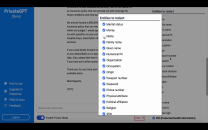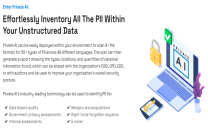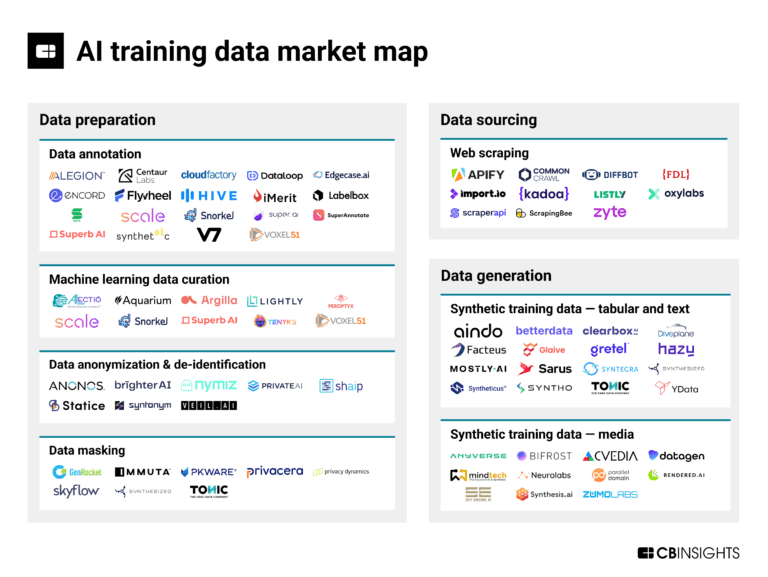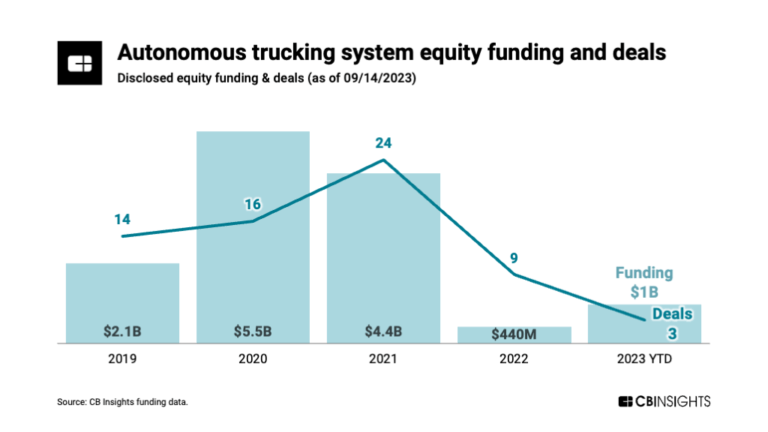
Private AI
Founded Year
2019Stage
Series A | AliveTotal Raised
$10.79MLast Raised
$8M | 3 yrs agoMosaic Score The Mosaic Score is an algorithm that measures the overall financial health and market potential of private companies.
-57 points in the past 30 days
About Private AI
Private AI specializes in the identification, redaction, and synthetic generation of personally identifiable information (PII) within various data types, operating in the data privacy and compliance technology sector. The company offers solutions that detect and anonymize sensitive information across text, audio, images, and documents, ensuring compliance with privacy regulations such as GDPR, HIPAA, and PCI DSS. Private AI's products are designed to integrate with large language models and are deployable on-premises or in the cloud, catering to a range of industries that handle sensitive data. It was founded in 2019 and is based in Toronto, Canada.
Loading...
Private AI's Product Videos


ESPs containing Private AI
The ESP matrix leverages data and analyst insight to identify and rank leading companies in a given technology landscape.
The data anonymization & de-identification market provides tools, technologies, and services for anonymizing and de-identifying sensitive information in datasets. Companies in this market help organizations remove personally identifiable information (PII) from the data they collect to protect user privacy and achieve regulatory compliance. The market addresses the growing need for organizations to…
Private AI named as Leader among 7 other companies, including Brighter AI, Anonos, and Nymiz.
Private AI's Products & Differentiators
Private AI De-Identification
Private AI provides an enterprise-grade, AI-driven solution for de-identifying unstructured healthcare data, ensuring compliance with privacy regulations like HIPAA and GDPR. Using advanced natural language processing (NLP) and synthetic data techniques, it detects and redacts personally identifiable information (PII) and protected health information (PHI) from clinical notes, images, transcriptions, and other unstructured sources. By preserving data utility while safeguarding privacy, Private AI enables healthcare organizations to unlock valuable insights, improve decision-making, and enhance research capabilities.
Loading...
Research containing Private AI
Get data-driven expert analysis from the CB Insights Intelligence Unit.
CB Insights Intelligence Analysts have mentioned Private AI in 2 CB Insights research briefs, most recently on Feb 20, 2024.

Feb 20, 2024
The AI training data market map
Aug 31, 2023
The responsible AI market mapExpert Collections containing Private AI
Expert Collections are analyst-curated lists that highlight the companies you need to know in the most important technology spaces.
Private AI is included in 3 Expert Collections, including Artificial Intelligence.
Artificial Intelligence
12,998 items
Companies developing artificial intelligence solutions, including cross-industry applications, industry-specific products, and AI infrastructure solutions.
Conference Exhibitors
5,302 items
AI 100 (All Winners 2018-2025)
100 items
Private AI Patents
Private AI has filed 2 patents.
The 3 most popular patent topics include:
- artificial neural networks
- data management
- knowledge representation

Application Date | Grant Date | Title | Related Topics | Status |
|---|---|---|---|---|
4/12/2024 | 3/25/2025 | Metadata, Data management, Natural language processing, Artificial neural networks, Knowledge representation | Grant |
Application Date | 4/12/2024 |
|---|---|
Grant Date | 3/25/2025 |
Title | |
Related Topics | Metadata, Data management, Natural language processing, Artificial neural networks, Knowledge representation |
Status | Grant |
Latest Private AI News
Jun 18, 2025
Feature ComplianceData PrivacyRegulation In a rapidly evolving global market, navigating cross-border data privacy is more challenging than ever. Here’s how companies can stay compliant while protecting their most valuable assets. Credit: Jack_the_sparow / Shutterstock As organizations expand internationally, IT leaders must navigate a maze of regulations, from the General Data Protection Regulation (GDPR), to the California Consumer Privacy Act (CCPA), as well as other region-specific privacy laws. So to stay compliant, they should have strong plans that cover data mapping, encryption, consent tracking, and see that vendors follow the rules. Here are eight essential steps to preserve data privacy compliance across borders, according to industry experts. Understand the data landscape CIOs need to know inside and out all the data their organizations handle before implementing any compliance strategy “Before tackling data privacy regulations, the first step is understanding your data: what you collect, why you collect it, and where it resides,” says Sylvestre Dupont, co-founder and CEO of AI data extraction software provider Parseur. Dupont says that distinguishing between data controllers and processors early on is critical. This approach helps companies follow rules and put the right protections in place based on the type of data and where it’s located. “Having a clear, accurate picture of your data landscape goes a long way in ensuring compliance across jurisdictions,” he adds. Leila Powell, lead data scientist at cybersecurity enterprise Panaseer, based in the UK, underscores the importance of building and maintaining accurate asset inventories. “One of the foundations of good security posture is maintaining accurate inventories of assets,” she says. “After all, you can’t protect what you don’t know is there.” Powell adds that validating security controls through multiple sources enables a source that’s crucial to maintain both privacy and security. “A single, validated source of truth all teams can share, and translated into language every stakeholder can understand, is invaluable,” she adds. Implement privacy by design Privacy should be built into every part of a business from the start, not added later. “Today, we’ve adopted a privacy-by-design approach, embedding data collection, storage, and processing considerations into the very foundation of application design,” says Subho Halder, CEO and CTO at Singapore-based mobile application security firm Appknox. “Privacy should never be an afterthought,” he says. “We treat it like an architectural principle we build into every product and service we deliver.” Halder further explains that their privacy-by-design strategy includes integrating automated tools to detect and mitigate privacy risks early. “Addressing privacy at the inception stage not only reduces risk but also fosters operational efficiency,” he says. For example, Boost Media Group embeds privacy by design from the first line of code and maintains alignment to standards, such as ISO 27001 for security and the NIST Privacy Framework, says David Afolabi, group head of systems and data, and acting chief information and data officer at the digital marketing agency. Develop a global privacy baseline Given the conflicting and evolving nature of global privacy laws, a one-size-fits-all approach is ineffective. Instead, companies should adopt a baseline standard that can be applied globally. “We default to the strictest applicable standard,” says Kory Fong, VP of engineering at Private AI in Toronto. “Our baseline makes sure we can flexibly adapt to regional laws without starting from scratch each time a regulation changes.” Fong also points out that the company’s system can quickly adjust policies as rules change. “To stay ahead of new regulations, we prioritize proactive privacy engineering and continuous monitoring of regulatory developments worldwide,” he says. “Our technology is designed to flexibly adapt to different definitions of personal information, and we invest heavily in partnerships with legal and compliance experts across regions.” Employ vendor compliance programs Data privacy isn’t just about a company’s own systems. Vendors and suppliers must also follow strict privacy rules. “Our supply chain and third-party risk management processes have been enhanced to see that all vendors, especially those handling sensitive data or systems, meet our rigorous privacy and security expectations, including audits and certifications such as ISO 27001 and SOC 2,” says Bryan Willett, CISO at Lexmark, the cloud-enabled imaging and IoT tech company. Scott Hertel, founding CTO at data privacy provider Osano is on the same page. “Understand your vendors,” he says. “Supply chain risks are a known weakness for cybersecurity professionals and privacy regulators, too. Knowing who you’re sharing your data with, and what they’re doing with it, is essential to minimize harm, understand whether data is being sold or shared with unknown parties, and reduce the likelihood of data being misused for attacks.” Stay ahead of the curve Being in front of emerging regulations is critical to maintaining compliance. “Proactivity is key,” says Fong. “It enables us to adapt without disrupting operations.” Private AI’s regulatory team is set up to spot upcoming legislative changes early, giving them time to adjust their strategy. “To stay ahead of new regulations, we prioritize proactive privacy engineering and continuous monitoring of regulatory developments worldwide so our products evolve in lockstep with the laws and standards our customers must comply to,” he adds. James Prolizo, CISO at Sovos, provider of tax compliance software, agrees that being proactive is key. “It’s about creating an environment where regulatory knowledge is baked into day-to-day decision making,” he says. “We regularly monitor global policy developments and involve our privacy experts early in the planning process so we’re prepared, not just reactive.” Alex Spokoiny, CIO at Israel’s Check Point Software Technologies, says to stay ahead of emerging regulations, his company has moved away from rigid policies to a much more flexible, risk-aware approach. “The key is staying close to what data we collect, where it flows, and how it’s used so we can adjust quickly when new rules come up,” he says. “We’re also using automation and smart tooling to help enforce things like data access, localization, or anonymization, depending on the context and the region. It’s about being ready to adapt.” Protect sensitive information De-identifying and encrypting data helps lower risks while still keeping the data useful. “At Private AI, our approach to adapting data governance strategies is rooted in building privacy into data pipelines,” says Fong. “We focus on de-identifying sensitive information at the earliest point possible, enabling organizations to work with rich, meaningful datasets while remaining compliant with regional privacy regulations like GDPR, CPRA, HIPAA, and others.” He adds that his company helps its clients get the most out of their data while keeping it secure by making data anonymous and only collecting what’s necessary right from the start. And to protect data, companies in general first have to know how data flows, the repositories where it’s stored, and who handles it, says Antonio Sanchez, chief strategy officer at quantum technology and data security company Quantum Xchange. “You’ll need to develop a classification system to tag all your data, which is a precursor to applying data protection policies,” he says. Deploy cross-functional collaboration Effective data privacy management requires a multidisciplinary approach, involving IT, legal, compliance, and product teams. “Cross-functional collaboration is built into our steering teams,” says Lexmark’s Willett. “Over the years, we’ve fundamentally transformed our approach to data governance by establishing the Enterprise Data Governance and Ethics community.” Willett notes that EDGE is a cross-functional group of senior leaders tasked with overseeing the company’s data management strategy. “EDGE sets data policies for Lexmark’s products, clarifies data-related roles across the organization, and ensures that each business area has designated data stewards and custodians to uphold governance standards,” he says. Sovos’ Prolizo agrees with Lexmark’s approach. “Rather than passing requirements from team to team, we bring stakeholders together upfront,” he says. “Everyone owns a piece of compliance, which makes it a shared goal rather than a checkpoint.” Spokoiny says this collaborative structure is vital to the company’s privacy strategy. “It’s become a must-have,” he says. “Privacy used to be something IT or legal handled on their own. Now it’s something product teams, compliance, legal, engineering do together. We’ve got privacy leads in key groups, shared goals tied to trust and data safety, and regular check-ins when launching new things. It’s a real team effort now.” Apply continuous training and awareness programs Privacy compliance is not a one-time effort. It requires ongoing education across all levels of the organization. “We’ve invested heavily in training programs tailored to specific roles,” says Willett. “Developers, for instance, understand not just how to build features but how to do so securely and in compliance with relevant privacy mandates.” Fong concurs, emphasizing the importance of annual legal awareness sessions for product teams. “CIOs should make it their responsibility to bridge the gap between legal and product, and make sure new features are developed with compliance in mind from day one,” he says. “Innovation doesn’t slow down when privacy is part of the process. It accelerates because you avoid costly rewrites later.” Nick DeMelas, chief experience officer at software developer Sourcetoad, says his company proactively maintains awareness of regulatory trends, geopolitical developments, and emerging technologies with research, alerts, RSS feeds, and keeps an eye on the industry overall. “Our team actively participates in ongoing internal training sessions, regularly sharing insights about privacy and security developments,” he says. “We also hold internal discussions and talks, such as recent sessions on differences between EU and US privacy standards, helping our team anticipate shifts rather than react to them.” Related content
Private AI Frequently Asked Questions (FAQ)
When was Private AI founded?
Private AI was founded in 2019.
Where is Private AI's headquarters?
Private AI's headquarters is located at 192 Spadina Avenue, Toronto.
What is Private AI's latest funding round?
Private AI's latest funding round is Series A.
How much did Private AI raise?
Private AI raised a total of $10.79M.
Who are the investors of Private AI?
Investors of Private AI include Forum Ventures, M12, Differential Ventures, Parliament Angels, Shasta Ventures and 8 more.
Who are Private AI's competitors?
Competitors of Private AI include CalypsoAI, Brighter AI, Wald, Datavant, Indika AI and 7 more.
What products does Private AI offer?
Private AI's products include Private AI De-Identification and 1 more.
Who are Private AI's customers?
Customers of Private AI include Crisis Text Line, Providence and Spring Health.
Loading...
Compare Private AI to Competitors

Syntonym specializes in generative artificial intelligence technology for privacy within the mobility and video communication sectors. The company offers face anonymization for videos and images to ensure privacy and compliance with data protection regulations. It primarily serves the security sector. The company was founded in 2019 and is based in London, United Kingdom.

YData specializes in enhancing data quality for data science and artificial intelligence applications within the technology sector. The company offers a platform for synthetic data generation, data quality profiling, and data-centric AI to improve AI model performance and ensure data privacy. It primarily serves sectors such as financial services, telecommunications, healthcare, and retail. The company was founded in 2019 and is based in Seattle, Washington.

MOSTLY AI specializes in synthetic data generation for various business sectors and focuses on creating high-fidelity synthetic datasets. The company offers a platform that enables the generation, synthesis, and creation of data, ensuring privacy and compliance with regulations. MOSTLY AI's solutions cater to needs such as AI/ML development, data sharing, testing and QA, and self-service analytics, providing tools for data democratization and insights through a natural language interface. It was founded in 2017 and is based in Vienna, Austria.

Betterdata provides data privacy solutions. It offers data privacy solutions, including product development and testing, data collaborations, data privacy verification, imbalance mitigation, and more. The company was founded in 2021 and is based in Singapore.

Anonos provides data protection solutions for unstructured data within large language model (LLM) workflows, operating in the data privacy and security sector. The company's offerings include reversible tokenization, access control, and policy adaptations to comply with regulations such as GDPR and HIPAA. Anonos serves sectors that require data protection, including financial services, healthcare, and technology enterprises. It was founded in 2012 and is based in New York, New York.

Maya Data Privacy specializes in data anonymization and compliance within the data privacy sector. The company offers solutions for anonymizing personally identifiable information (PII) to ensure compliance, while retaining the data's utility for business analysis. Maya Data Privacy primarily serves sectors that handle sensitive personal data, such as healthcare, human resources, and financial services. It was founded in 2022 and is based in Dublin, Ireland.
Loading...
